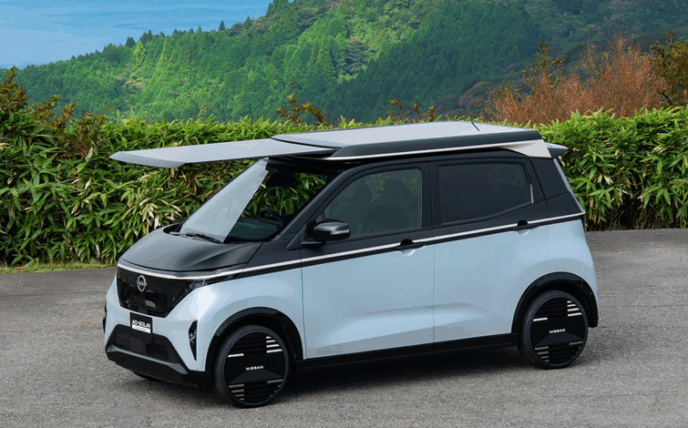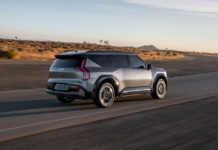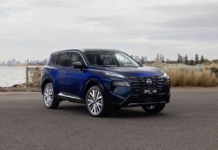
Nissan has developed an extendable solar roof system that can generate enough electricity to power up to 3000 kilometres of driving annually, with the Japanese automaker planning a commercial launch of the technology.
The “AO-Solar Extender” will be showcased on Nissan’s Sakura electric vehicle at the Japan Mobility Show, which begins on 30 October. The system represents a shift from prototype solar roof concepts to a commercially viable product.
The extendable roof-mounted system can generate up to 500 watts of power when fully extended while parked, allowing the panels to expand outward and increase their surface area for maximum solar collection. When driving with the panels closed, the system produces up to 300 watts, and continues generating up to 80 watts even during rainy conditions.
Nissan says the technology enables the vehicle to draw solar power whether parked or driving, with the development team estimating the annual driving range boost at up to 3000 kilometres.
Sakura leads Japan’s EV market
The Sakura, Nissan’s electric kei car, has been Japan’s most popular electric vehicle for three consecutive years. Nissan describes the model as “often praised for its sufficient driving range,” though the solar roof system will provide additional range capability.
The kei car segment represents a uniquely Japanese vehicle category, with strict size and engine displacement limits that make them ideal for urban driving and parking in Japan’s dense cities.
Unlike previous automotive solar roof demonstrations that remained at prototype stage, Nissan has confirmed plans for commercial production of the AO-Solar Extender, though specific launch dates and pricing details will be announced later.
Australian market potential
Australia’s solar conditions could make such technology particularly effective, given the country leads global household solar panel adoption and has abundant sunshine across most regions. The technology could complement Australia’s growing electric vehicle market, which saw battery electric vehicle sales increase 92% in the first half of 2025 according to industry data.
Australian EV owners already benefit from the country’s renewable energy resources, with many charging their vehicles using rooftop solar systems. An integrated vehicle solar roof could extend this concept by enabling charging while away from home.
The Japan Mobility Show runs from 30 October, with press previews beginning 29 October. Nissan will provide additional details about commercial availability and market rollout plans for the AO-Solar Extender during the event.

Automobile Magazine-AU




























